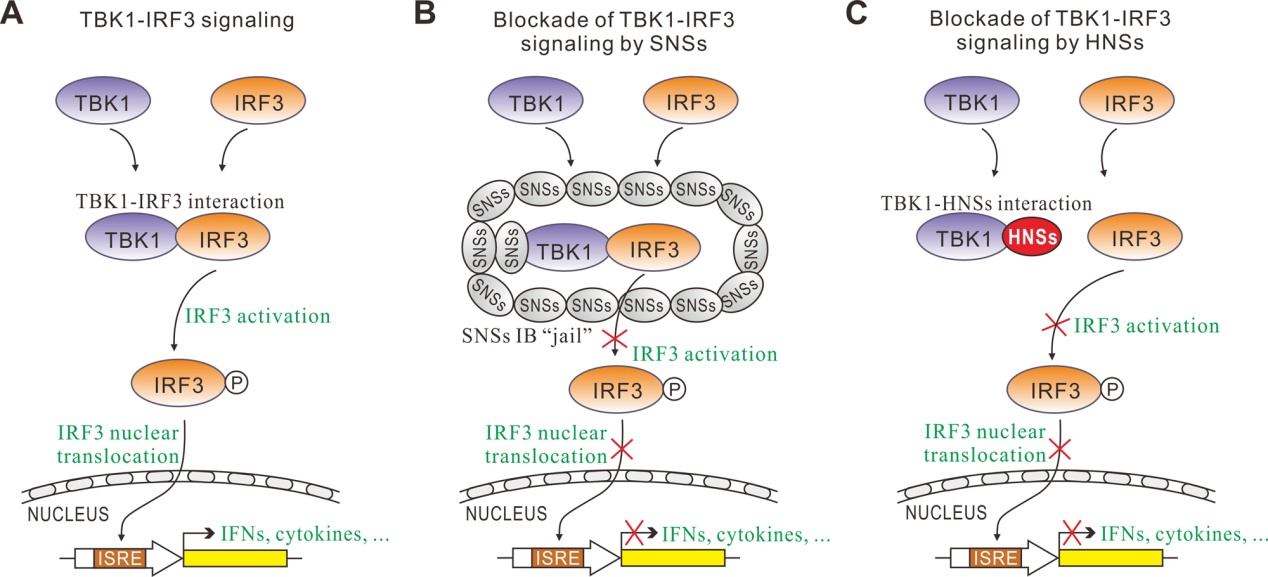A Study Showed that HRTV NSs functions as a robust antagonist of host innate immunity
Date:04-09-2017 | 【Print】 【close】
Heartland virus (HRTV) is a novel phlebovirus (Phlebovirus genus, Phenuiviridae family, Bunyavirales order) associated with a severe febrile illness in humans. The original cases of HRTV infections were reported in two Missouri farmers hospitalized with fever, leukopenia, and thrombocytopenia in 2009. HRTV is genetically related to the severe fever with thrombocytopenia syndrome virus (SFTSV), also a highly pathogenic phlebovirus emerging in China and neighboring countries. The emergences of SFTSV, HRTV, and their recently discovered relatives, collectively termed the SFTSV/HRTV-group viruses, have raised new concerns to the public health worldwide. However, there is currently no vaccine or drug available against these emerging viruses. Furthermore, whether and how HRTV can interfere with the host innate immune response is unknown.
In a present study, the research group led by Prof. WANG Hualin from Wuhan Institute of Virology of the Chinese Academy of Sciences showed that HRTV NSs (HNSs) also functions as a robust antagonist of host innate immunity, thus promoting viral replication. Although its expression appears not to induce noticeable IB formation in multiple cell lines they tested, HNSs can inhibit RLR-mediated antiviral signaling and virus-infection-triggered IFN and inflammatory cytokine expression.
Mechanistically, the scientists found that HNSs disrupts the IFN-stimulated response element (ISRE) activation by interfering with IRF3 phosphorylation and nuclear accumulation; furthermore, HNSs interacts with TBK1 and likely hinders TBK1-IRF3 association, thus disabling IRF3 activation and IFN and cytokine induction.
In summary, this study identified HRTV NSs as a robust antagonist of the host innate immunity. HNSs strongly interacts with the host kinase TBK1 and suppresses the transcription factor IRF3 activation by obstructing the TBK1-IRF3 interaction and signaling, resulting in the blockade of IFN and inflammatory cytokine induction. These findings will benefit the better understanding of viral pathogenesis and the development of antiviral therapeutics.
The results have been published in Journal of Biological Chemistry entitled "Heartland virus NSs protein disrupts host defenses by blocking the TBK1 kinase–IRF3 transcription factor interaction and signaling required for interferon induction".
This work was supported by the National Natural Science Foundation of China, the strategic priority research program of the Chinese Academy of Sciences, the National Basic Research Program (973 Program) of China, the Science and Technology Basic Work Program, the National Key Research and Development Program of China, European Union’s Horizon 2020 project European Virus Archive goes global (EVAg), the Hubei Provincial Natural Science Foundation of China, and the “One-Three-Five” Research Program of Wuhan Institute of Virology.

TBK1-IRF3 signaling and its blockade by SNSs or HNSs. Image by WANG Hualin
Contact:
WANG Hualin
Email:h.wang@wh.iov.cn
Wuhan Institute of Virology, Chinese Academy of Sciences, Wuhan 430071, China (http://english.whiov.cas.cn/)
